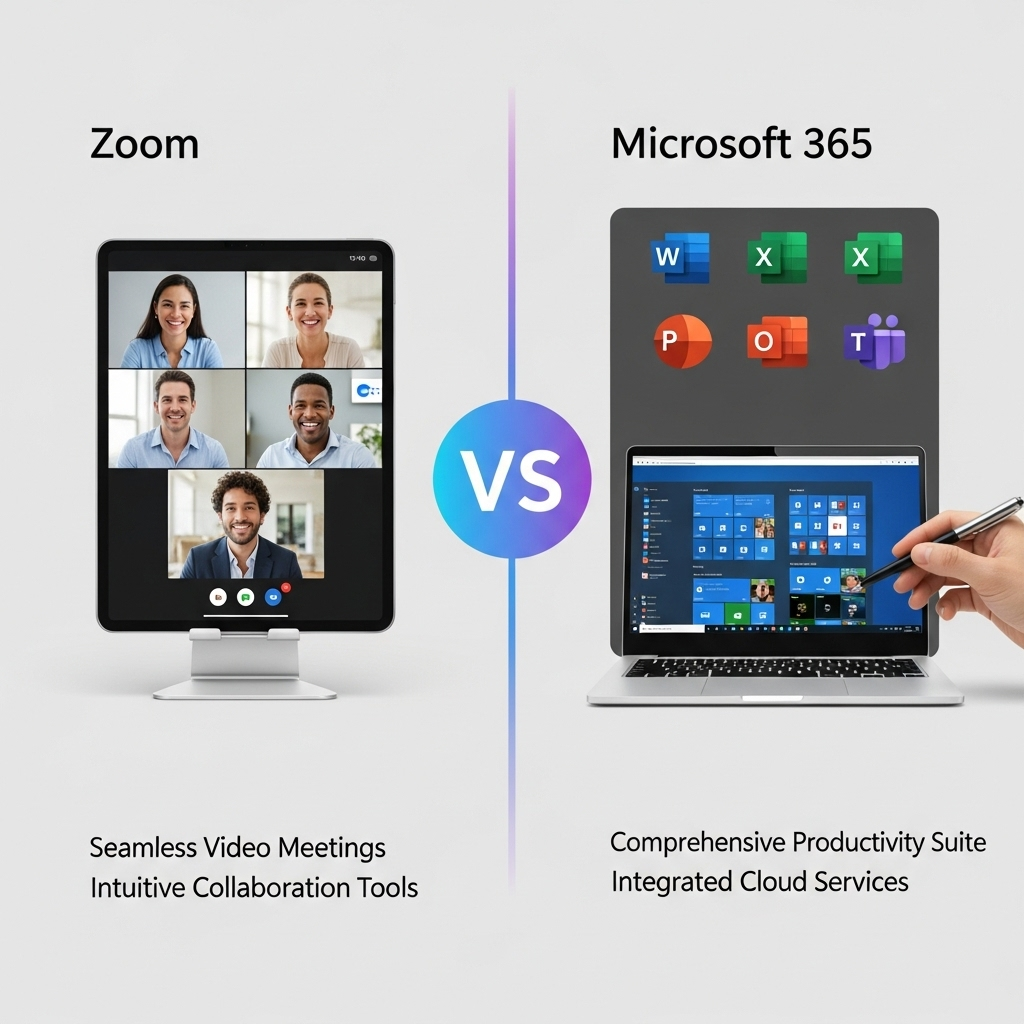Productivity software: Zoom vs. Microsoft 365
Quick Verdict
Both Zoom and Microsoft 365 offer robust video conferencing and collaboration tools, with Zoom excelling in ease of use and flexible screen sharing, while Microsoft 365 provides a broader suite of integrated applications and stronger security features.
- Zoom offers a simple and intuitive interface with flexible screen sharing.
- Microsoft 365 provides a comprehensive suite of integrated applications and robust security features.
- Both platforms support large meetings and offer mobile app functionality.

Key features – Side-by-Side
| Attribute | Zoom | Microsoft 365 |
|---|---|---|
| Video Conferencing Quality | High-quality video and audio, noise suppression, virtual backgrounds | Microsoft Teams allows users to schedule and hold video meetings with screen sharing. Presenting from a wired connection helps with reliable audio, video, and screen sharing. |
| Screen Sharing Capabilities | Share entire desktop, specific application windows, a portion of their screen, or content from a second camera; supports audio and video sharing; multiple participants can share screens simultaneously. | Teams allows screen sharing during video conferences. It is easy to share different types of content during screen sharing. |
| Meeting Recording and Transcription | Cloud recording; automatic transcripts (with tools like Otter.ai); host control over recording permissions. | Teams offers meeting recording to the cloud, and also provides captions and transcriptions. |
| Collaboration Tools Integration | Integrates with Google Workspace, Slack, Microsoft Teams, Trello, Asana, etc. | Integrates applications such as Teams, Word, Excel, PowerPoint, OneNote, SharePoint, Planner, Stream, and Power BI. Teams integrates with SharePoint and OneDrive for document sharing. Connects with third-party apps using built-in connectors or platforms like Zapier and Automate.io. |
| User Interface and Ease of Use | Simple and intuitive interface. | Microsoft emphasizes that they are using Microsoft 365 to empower their employees to achieve more by driving better teamwork and collaboration in our teams. |
| Security Features and Compliance | End-to-end encryption (E2EE), meeting passwords, waiting rooms, meeting lock; HIPAA-compliant plans available. | Built on a security framework with multi-factor authentication, security defaults, and data loss prevention. Microsoft Defender for Office 365 protects against phishing and malware. Offers features to help organizations meet compliance requirements and protect data, including eDiscovery and audit logs. |
| Scalability for Large Meetings | Plans support 100 to 1,000+ participants. | Teams meetings can support interactive capabilities for up to 1,000 users, with a view-only experience for up to 10,000 participants. |
| Mobile App Functionality | iOS and Android apps with most desktop features. | Several Microsoft 365 apps have versions available for mobile devices (Windows Mobile, iOS, and Android). The mobile apps integrate with OneDrive and SharePoint. Editing functions on the mobile app might be limited as compared to the desktop version. |
| Pricing and Subscription Options | Free Basic plan, paid Pro, Business, and Enterprise plans. | Personal: $6.99/month (Personal), $9.99/month (Family). Business: $6/user/month (Basic), $12.50/user/month (Standard), $22/user/month (Premium). Enterprise: $36/user/month (E3), $57/user/month (E5) |
| Customer Support and Documentation | Website, help center, community forums. | Offers ongoing tech support with subscriptions. |
| Integration with Calendars and Scheduling | Integrates with Google Calendar, Microsoft Outlook, Apple Calendar. | Calendar integrates with other apps like Outlook and Teams. Schedule Teams meetings directly from the SharePoint calendar. |
| File Sharing and Storage | File sharing during meetings, cloud storage for recordings; integrates with Google Drive and Dropbox. | Includes OneDrive and SharePoint for file sharing. OneDrive is designed for individual use. SharePoint is designed for team collaboration. |
Overall Comparison
Video Quality: Both High; Integration: Microsoft 365 wins; Ease of Use: Zoom wins
Pros and Cons
Zoom
Pros:
- Reliable video conferencing
- High-quality video and audio
- Noise suppression
- Virtual backgrounds
- Flexible screen sharing options
- Cloud recording
- Automatic transcripts (with integrations)
- Integration with various collaboration tools
- Simple and intuitive interface
- End-to-end encryption (E2EE)
- Meeting passwords
- Waiting rooms
- Meeting lock
- HIPAA-compliant plans available
- Scalable for large meetings
- Functional mobile apps
- Calendar integration
- File sharing and storage
Cons:
- No major disadvantages reported.
Microsoft 365
Pros:
- Integrates various applications (Teams, Word, Excel, etc.)
- Offers multi-factor authentication and data loss prevention
- Supports large meetings (up to 1,000 interactive users)
- Mobile apps available for Windows Mobile, iOS, and Android
- Integrates with calendars and scheduling tools
- Includes OneDrive and SharePoint for file sharing
Cons:
- Editing functions on the mobile app might be limited compared to the desktop version
User Experiences and Feedback
Zoom
What Users Love
- Reliable video conferencing
- Easy screen sharing
- Host control over recording permissions
- Integrates with various productivity tools
- Simple and intuitive interface
- Offers several security measures
- Can handle meetings with a large number of participants
- Functional mobile apps
Common Complaints
- No major complaints reported.
Value Perception
- Total cost of ownership (TCO) for Zoom is $581 in the first year compared to the industry average of $891
Microsoft 365
What Users Love
- Empowers employees through teamwork and collaboration
- Enhances workflows and productivity with third-party integrations
- Provides the latest features, fixes, and security updates with a subscription
Common Complaints
- No major complaints reported.
Value Perception
- No value feedback reported.